What’s that smell?! Is that my diffuser that smells moldy? Do diffusers cause mold?
Unfortunately, our amazing therapeutic diffusers are the perfect homes for mold to grow! Let’s go into more detail of why diffusers cause mold.
Contents
- Why Do Diffusers Cause Mold?
- Are Mold And Mildew The Same Thing?
- Is Mold In Diffusers Toxic?
- How To Remove Mold From A Diffuser
- Preventing Mold From Growing
- Essential Oils For Mold And Mildew
- Frequently Asked Questions (FAQ)
- 1. Why does my diffuser smell like mildew?
- 2. What is the most effective essential oil that kills black mold?
- 3. What is a mold spore? And are they harmful?
- 4. Should I use bleach to clean my diffuser?
- 5. How often should I clean my diffuser in general?
- 6. How often should I clean my diffuser with vinegar?
- Conclusion
Why Do Diffusers Cause Mold?
Diffusers do cause mold. It’s easy for mold to grow inside diffuser water tanks because they are both humid and dark.
When we leave water sitting in our diffusers for days and weeks we are bound to get an unexpected visitor. This is especially true if we leave moisture and don’t clean our diffuser properly before storing it away.
Leaving a diffuser like that is a free invitation for mold to rent out the place. It’s like those Mucinex commercials! We do not like these visitors, nor are they safe for us to breathe them in.
Are Mold And Mildew The Same Thing?
Kind of. Mildew is a type of mold or fungi that grows in the early stages and only in certain places.
Mildew normally grows on shower walls, bathtubs, window sills, essential oil diffusers, ceiling tiles, and plants. So, pretty much anywhere that has humidity and moisture.
Mold on the other hand can grow on a lot more surfaces than mildew can. Mold can survive on organic matter like food, clothes, leather, paper, ceilings, walls.
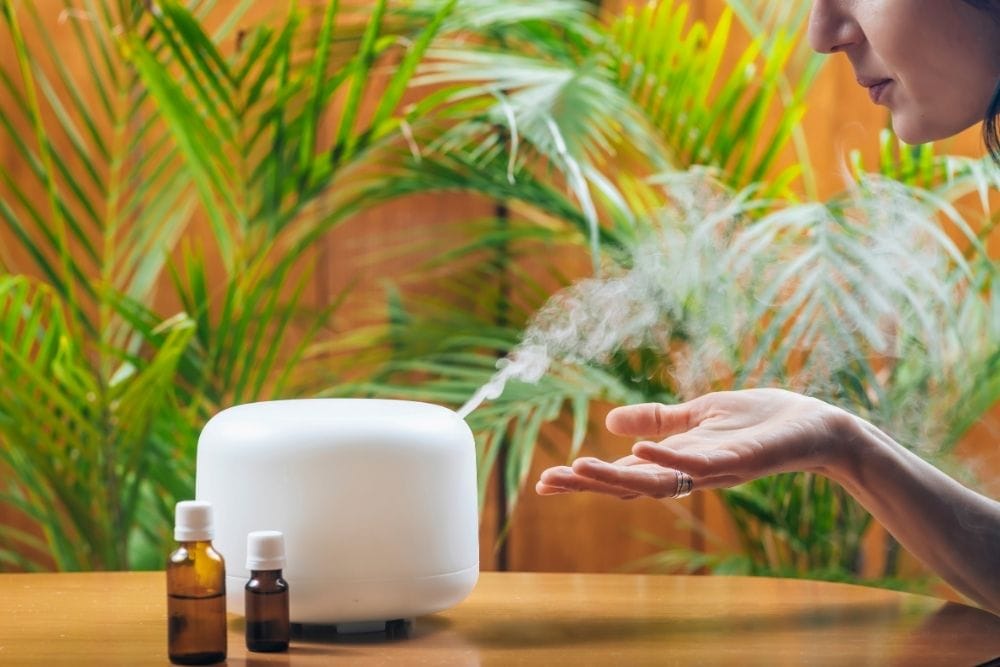
A good way to explain the difference is mildew grows on non-porous surfaces while mold grows on porous surfaces. But either way, people will use mold and mildew interchangeably.
For us visual learners, here is an organized table to show you the difference between mold and mildew.
Mold | Mildew | |
| Appearance | Black, Yellow, Or Green | White, Brown, Or Gray Splotches |
| Smell | Musty Rotten Wood Or Paper | Musty And Wet Dirty Socks |
| Texture | Fuzzy Or Slimy | Fuzzy Or Powdery |
| Surface Damage | Long-lasting Damages | Short-term Damages |
| Growth Timeline | Starts Growing Between 24 Hours To 48 Hours | Starts Growing Between 24 Hours To 48 Hours |
| Health Symptoms |
|
|
Is Mold In Diffusers Toxic?
Yes, mold in diffusers can be toxic! Not all mold is toxic but many of them are.
Mold in a diffuser is an unpleasant sight, but what’s worse is, mold can also cause some unpleasant health problems. Mold in diffusers causes 2 main health problems: Breathing problems and allergies.
Breathing Problems
Running your diffuser when it has mold living inside of it can produce and release allergens, irritants, and mycotoxins into the air you breathe. Yuck!
Some awful breathing illnesses and infections you can get from a moldy diffuser are:
- Aspergillosis
- Pneumonitis
- Bronchitis
- Allergic alveolitis
- Rhinosinusitis
- Fungal sinusitis
All of these breathing illnesses and infections are serious but getting aspergillosis from a moldy diffuser is probably the worst. Some types of aspergillosis like the “fungus ball” can cause you to cough up blood! Yikes, that’s scary!
If you already struggle with breathing or asthma, mold in your diffuser is your new best enemy. Chronic lung condition plus mold, no thanks!
Allergies
You tell yourself, “It’s allergy season. That’s probably why I’m sneezing and my eyes itch like crazy!” Guess again.
Mold allergies present the same way as your regular seasonal allergies. It can be extremely tricky trying to distinguish the two.
Similar symptoms to look out for are:
- Itchy throat
- Itchy and watery eyes
- Sneezing
- Runny nose
As you can see, it’s tough to tell the difference between allergies and mold allergies. Here are some more symptoms to pay attention to.
Do you feel any of these symptoms after running your diffuser?
- Wheezing
- Irritated skin
- Fatigue
- Nausea
- Headaches
- Insomnia
- Mucous membrane irritation
Before popping an allergy pill, you might want to check your diffuser to see if it’s smelling like mildew or growing some gnarly mold. Yuck!
How To Remove Mold From A Diffuser
Well, crud. Your prevention methods didn’t work as you hoped they would.
Maybe this week has been busy and you accidentally let your diffuser sit for a week with water in it. Great, now there’s mold growing inside of it. It happens to all of us, so don’t worry!
Cleaning mold from your diffuser is an easy process. Thank the heavens!
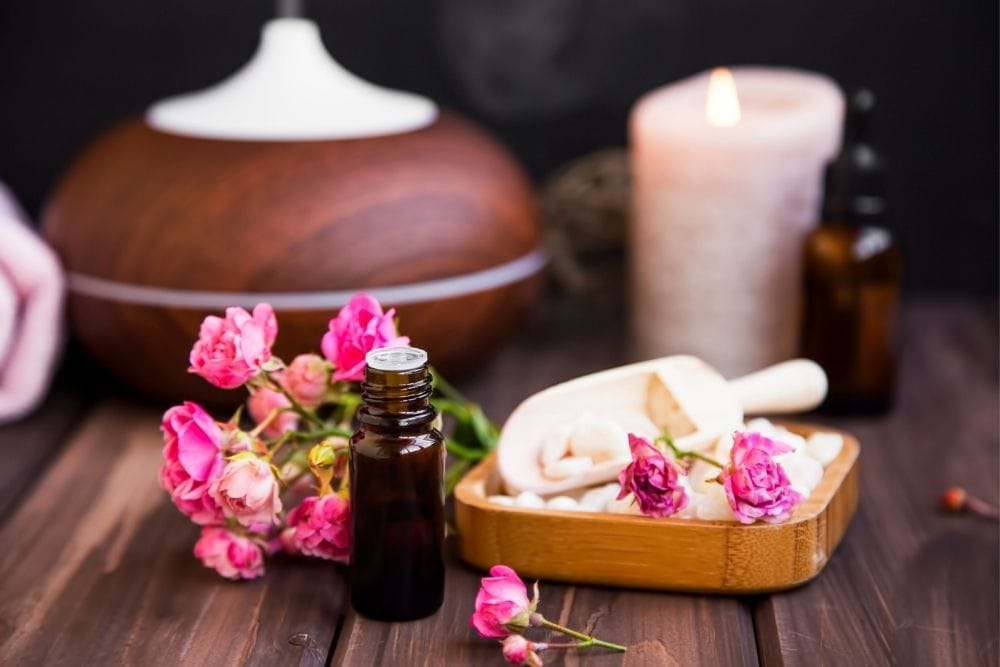
The ingredients you’ll need to remove mold from a diffuser are vinegar and water. Just 2 ingredients!
5 Steps to remove mold from a diffuser:
- Pour clean water into your diffuser
- Add 10 drops of vinegar
- Run your diffuser for 3-5 minutes
- Empty and rinse out your diffuser
- Enjoy once again!
Vinegar is the most natural cleaning agent you can use on a moldy diffuser. It doesn’t smell the best (depending on your sniffer!), but it gets the job done.
There are other ingredients you can use in place of vinegar. Some of the most commonly used cleaning agents are hydrogen peroxide, baking soda, salt, and pepper (Just kidding, don’t use pepper to clean your diffuser!).
Whatever you do, don’t ever mix vinegar and bleach to clean your diffuser. Vinegar and bleach mixed are extremely toxic!
Also, whatever you end up using to clean your diffuser with, make sure it’s something you could regularly inhale that wouldn’t cause health issues. A good example of this could be all-natural dishwashing detergent.
Preventing Mold From Growing
The obvious answer, that we all don’t want to hear is, we need to clean our diffusers regularly. It’s not fun, but it must be done.
Cleaning your diffuser is the lesser of 2 evils. Wouldn’t you rather clean your diffuser than come down with a breathing illness? Yeah, me too!
To prevent mold in your diffuser you will also want to learn how to store it properly when you don’t plan on using it for a while. Leaving any kind of water or leftover essential oil inside of your diffuser is food for mold to grow.
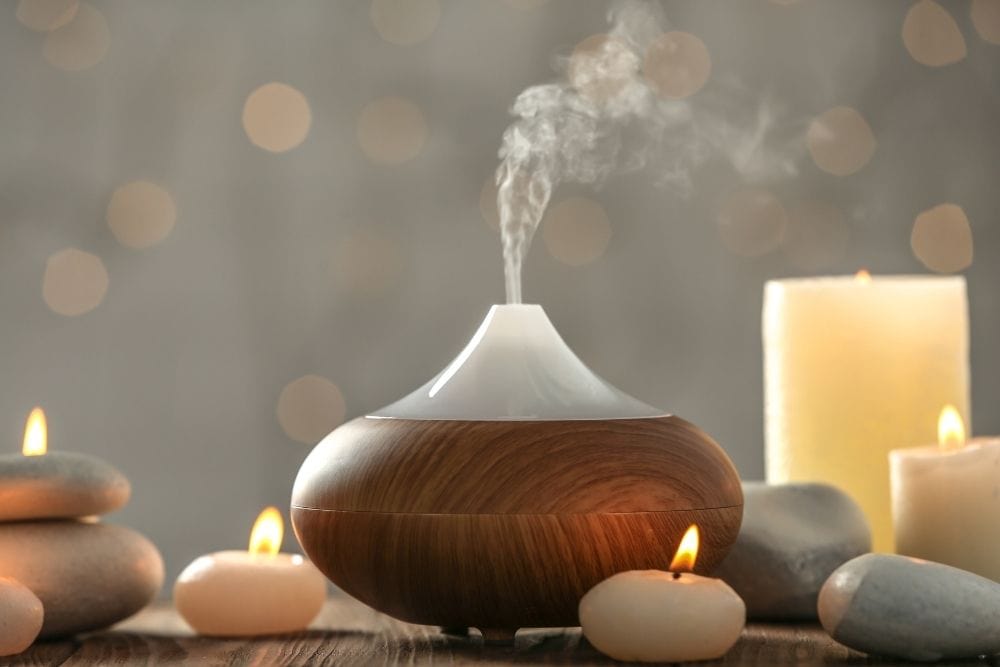
Remember these 2 things to prevent mold from growing in your diffuser:
- Clean your diffuser out every day
- Store your diffuser properly
If you follow those 2 steps, you most likely won’t have to research how to remove mold from your diffuser. Now, wouldn’t that be nice?
Essential Oils For Mold And Mildew
You can follow the 2 steps above and on top of that, you can also use essential oils to help you out some. Essential oils can’t remove mold but some of them can help prevent mold from growing in the first place.
Mold-fighting essential oils!? What?! Yup, you read that right.
Here is a list of the 7 BEST mold-fighting essential oils:
- Cinnamon
- Clove
- Lemon
- Peppermint
- Tea Tree
- Thieves (Blend)
- Thyme
All 7 of these essential oils work wonders in your diffusers. Let’s jump feet-first into a better breakdown of why each one of these essential oils is a rockstar when it comes to mold-fighting.
1. Cinnamon
The natural library of medicine did a research study on the effectiveness of cinnamon oil against mold. Their results found that cinnamon oil had the best inhibitory effect against mold.

Another piece of information to add here is cinnamon bark is more effective than the cinnamon leaf. Cinnamon bark oil is great at preventing Aspergillus and Penicillium mold from growing.
There is no doubt about it, cinnamon essential oil is a great mold-fighter for your diffuser. If you’re contemplating between the 2, buy the cinnamon bark over the cinnamon leaf.
2. Clove
Clove has a smell similar to cinnamon oil but properties similar to tea tree oil. The cool thing about clove is it fights mold in your diffuser while boosting your immune system.
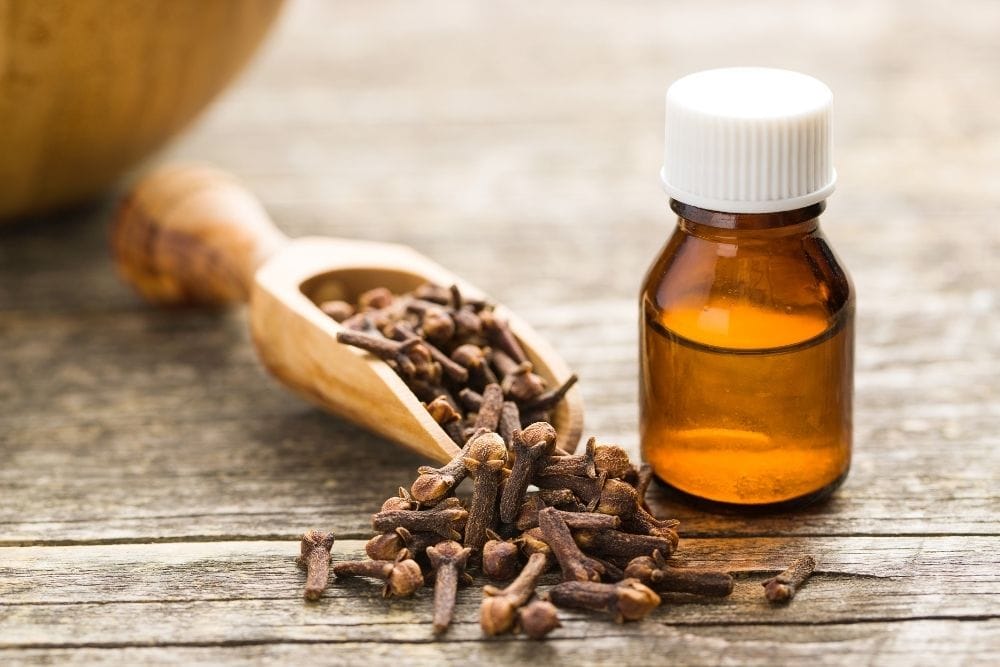
2-in-1! Clove essential oil causes mold to become inactive AND it prevents mold spores.
3. Lemon
You’ll find lemon fragrance in a lot of household cleaning supplies. Lemon essential oil is an antifungal that destroys mold spores when they are just wee little guys.

Drop some lemon essential oil into the water of your diffuser and prevent mold from getting the idea of growing in the first place. Buh-Bye!
4. Peppermint
Between the 7 essential oils listed, this one is the least effective for preventing mold in diffusers. Peppermint essential oil did make this list though because of its menthol content.

A 2003 study revealed that peppermint vapors killed fungi and mold. So, although it doesn’t work as effectively as the other oils listed, it’s still a good one to have on hand.
5. Tea Tree
Prevent mold in your diffuser and home by using tea tree oil. Tea tree essential oil has antimicrobial and antifungal fighters ready to protect at the drop.
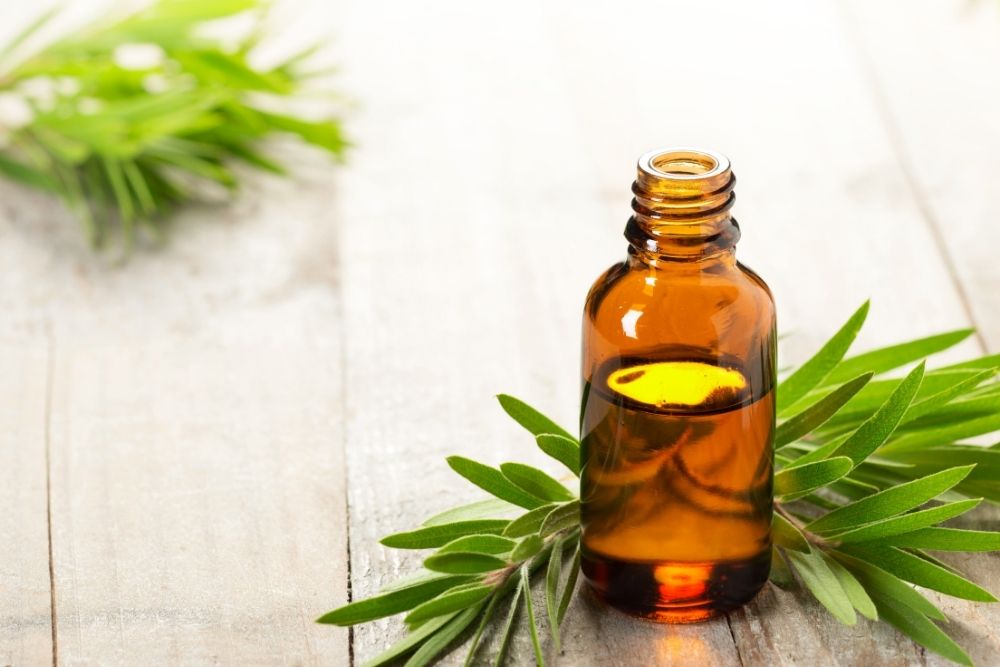
Wow! Tea tree essential oil not only prevents mold but it cuts through the nasty smell of mildew.
6. Thieves
Of the 7 mold-fighting essential oils, Thieves is a blend and considered one of the most popular oils for preventing mold and mildew in your diffuser.
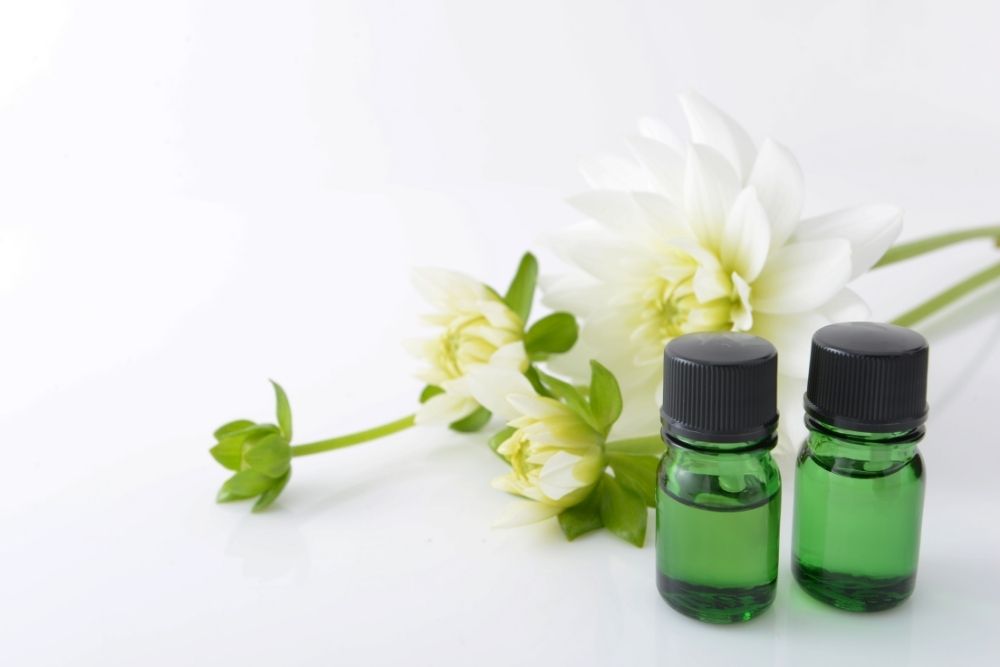
Thieves consist of cinnamon, eucalyptus, clove, lemon, and rosemary essential oils. This mixture of multiple oils makes Thieves great at preventing mold.
7. Thyme
Thyme is a primary essential oil used against mold. Thyme essential oil has thymol which holds fungicidal fighting properties.

Remember that nasty Aspergillus mold species from earlier? Thyme oil is effective at killing it and preventing penicillium mold from growing.
There are several essential oils you can use to help prevent mold from growing in your diffuser. Which one will you try out today?
Frequently Asked Questions (FAQ)
1. Why does my diffuser smell like mildew?
Water and/or essential oil remnants have been sitting in your diffuser’s water tank for at least 24 hours. It’s time to clean out your diffuser.
2. What is the most effective essential oil that kills black mold?
Tea tree oil is by far the best essential oil for specifically black mold invasions. Make sure to buy real tea tree oil made from the melaleuca alternifolia. The solution consists of 1 teaspoon of tea tree oil and 1 cup of water.
3. What is a mold spore? And are they harmful?
A mold spore is part of the mold molecule that can be released into the air and inhaled causing mild to severe health problems.
In small amounts, mold spores are usually harmless. What makes mold spores harmful is when they land on wet surfaces and begin to grow.
4. Should I use bleach to clean my diffuser?
Although bleach is a great mold remover agent, it is toxic and should never be diffused. If you use bleach to clean a diffuser, there may be residual bleach in your diffuser. This means, the next time you use your diffuser, you could be inhaling bleach fumes.
5. How often should I clean my diffuser in general?
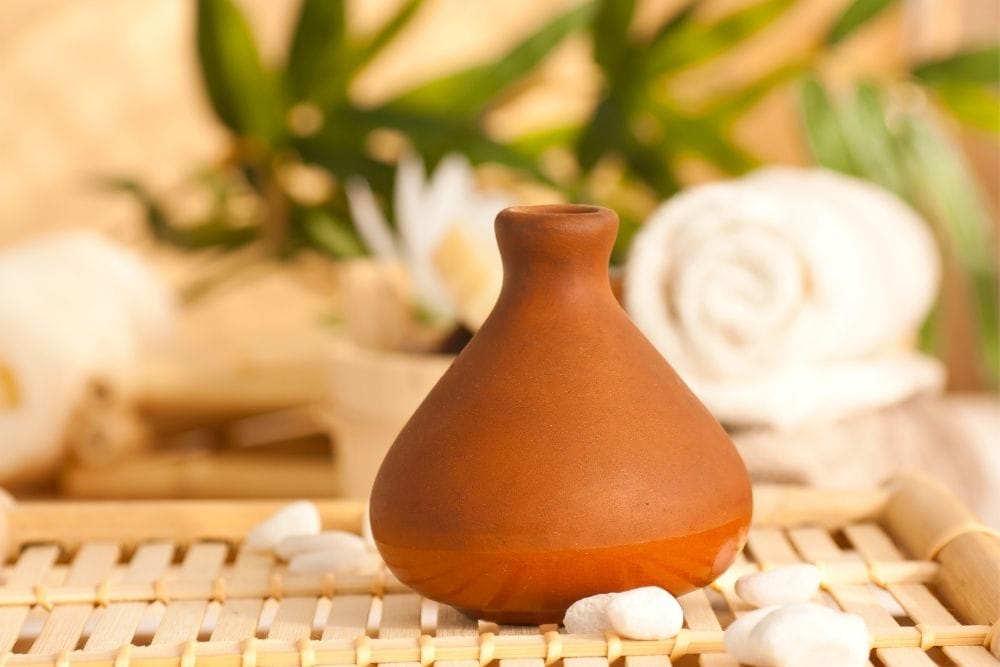
You should be regularly rinsing out and wiping off any leftover water and essential oils after every use. If you use your diffuser multiple times a day, then cleaning it after every use may not be easy for you. At least try and rinse and wipe down your diffuser every 24 hours (once a day).
6. How often should I clean my diffuser with vinegar?
You will want to do a deep clean of your diffuser with vinegar at least once a month to remove any dust or possible mildew and mold growth.
Conclusion
You made it to the end! Phew, that was a long but informational article, to say the least.
Mildew and Mold are similar but different. Mildew is a form of mold that can grow in your diffuser if it’s not cleaned regularly or stored properly.
Today, you received the 7 best mold-fighting essential oils list. You learned some great ways of preventing mildew and mold from growing in the first place.
Also, you’ve learned just how important it is to keep our diffusers clean. Now you know the best solutions and how to clean mildew and mold from your diffuser.
All in all, diffusers cause mold. If you’ve put off the task of cleaning your diffuser, then follow our simple cleaning steps, and continue enjoying your diffuser in the healthiest way possible!

I currently work as a medical receptionist, but my ultimate goal is to work as an occupational therapy assistant. Helping others achieve a better quality of life is something I’m after. That’s one of the main reasons I started this blog. Learn more about me.
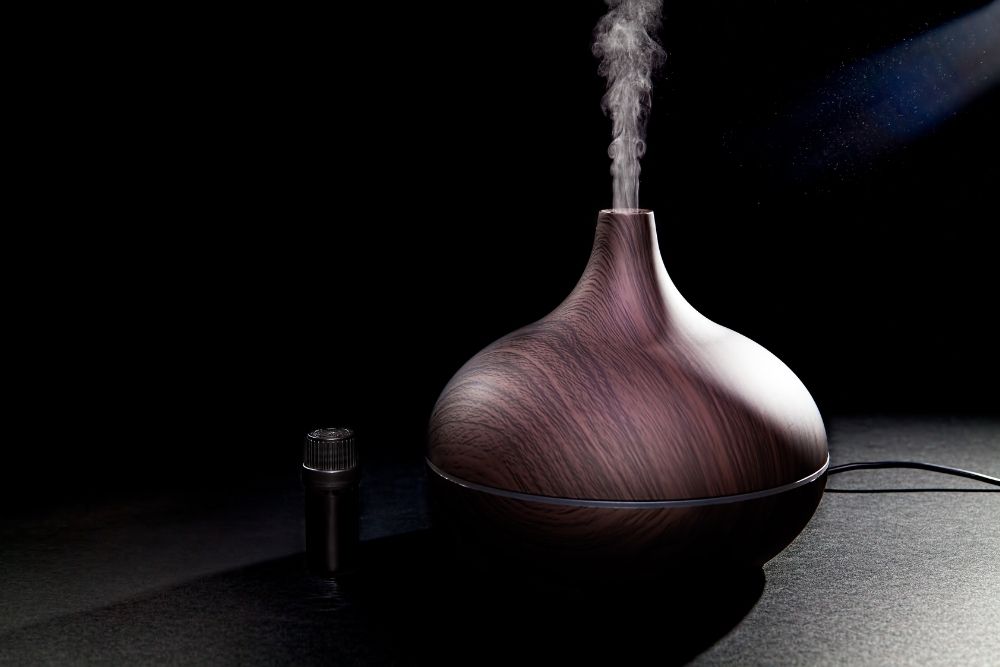

Aleka
Monday 28th of November 2022
Thank you for your great piece on diffusers and mold. Looking forward to giving my 5 diffusers a big clean with vinegar! ?